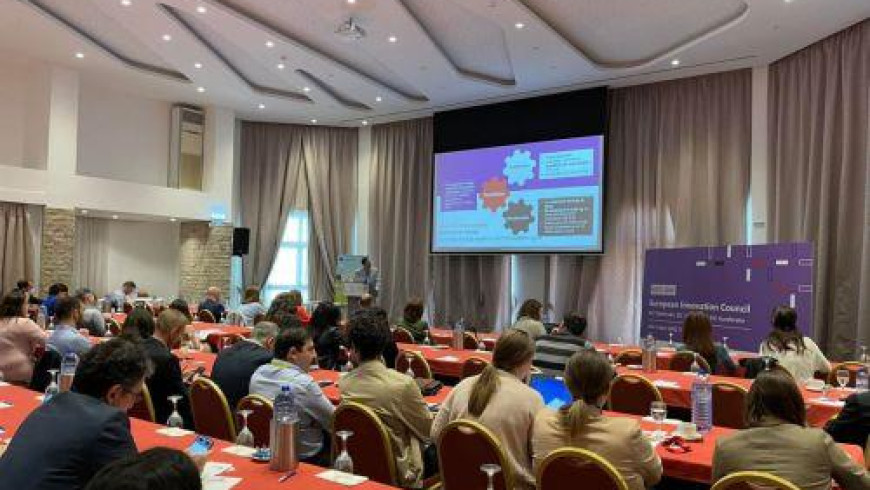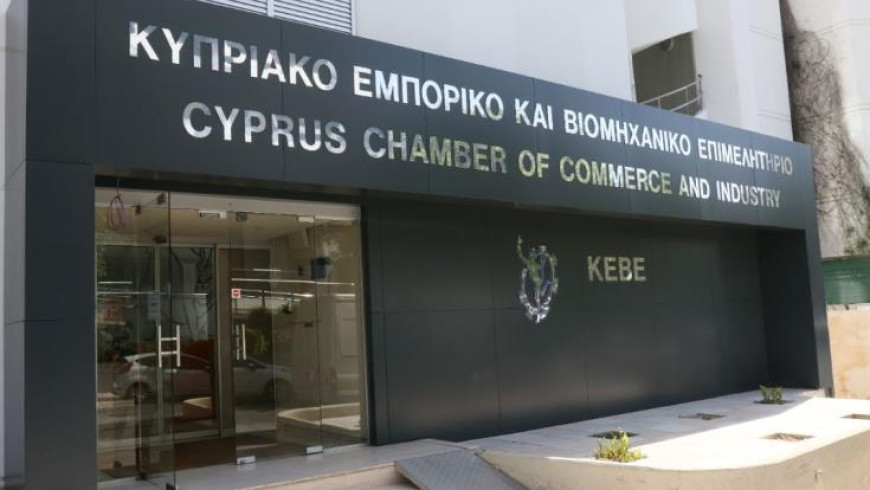
The government considers foreign investors and companies opting to relocate in Cyprus as “valuable partners” in its growth plan, President of the Republic told an event gathering of foreign investors and companies operating in Cyprus, pledging to create an economic environment to accomplish their goals.
The aim of the event held at the Presidential Palace, carried out in collaboration with Invest Cyprus, in the presence of more than 100 foreign investors, was to brief them on the government’s recent actions and initiatives to improve the business and investor environment in Cyprus. The event came one day after the Council of Ministers approved a series of changes to the Strategy to attract Foreign Companies and talent, which were implemented following a previous discussion with investors held in the Presidential Palace last June.
“My main message to you today is this. The Government values your presence and commitment in Cyprus and sees you as valuable partners in our growth path. We are dedicated to going above and beyond to foster an economic and business environment that induces you to accomplish your goals, to grow and expand; an environment that not only meets but exceeds your expectations,” President Christodoulides said addressing the event.
He stressed that a stable and thriving economy is a prerequisite for the success of any investment or business, forming the fundamental condition for sustainable growth and prosperity.
“We are optimistic about the trajectory of the Cyprus economy,” he said, adding the positive performance is confirmed by the successive upgrades from rating agencies, which are all now placing us in an investment-grade category.
“Their decisions constitute a recognition of the responsible and non-populist economic policies we have been promoting and represent a vote of confidence in the government plans. However, we are by no means complacent,” he said.
Our government, he added, has already outlined a clear policy direction towards the creation of a new economic model focusing on the attraction of productive investments which can contribute to the double transition – green and digital – and to the creation of a knowledge economy.
“We aim to continuously improve the variables for attracting foreign investment with significant added value and contribution towards long-term growth and prosperity in the economy, and the society. Establishing Cyprus as an attractive investment destination and business center is one of the top priorities of my government,” he said.
Noting that this task is not easy as we live in the era of globalization whereby disruptive developments have become the new norm and geopolitical tensions continue to persist, the President noted “we are expected to take actions that will mitigate the uncertainty.”
“It is therefore crucial for us to have a clear plan in place, prioritizing the effective implementation of measures, steering away from policies that have created legacies in the past. Cyprus' reputation as a credible and reliable business centre occasionally threatened, hampering its competitiveness. I want to assure you that this is a priority issue for which we are taking concrete steps to address, demonstrating zero tolerance for practices that expose our country internationally,” he went on say.
Furthermore, the President recalled that last week he presented the governance program for 2024, featuring more than 80 concrete actions, outlining for the first time, the Government's Annual Action Plan in advance, thus contributing significantly to transparency and accountability.
He noted that the Action Plan is based on six key pillars, the improvement of everyday life of citizens by tackling bureaucracy, promoting digital transformation, and addressing chronic problems such as migration and traffic, ensuring a strong and resilient economy, laying the foundations for a better tomorrow with education and health at the heart of our efforts, promoting the green transition, promoting the modernisation and restructuring of the state through the strengthening of institutions. And making Cyprus a strong partner both in the EU and in the wider region.
The amendments to the strategy
Speaking to the event, Minister of Finance Makis Keravnos said “our vision is for Cyprus to become one of the best countries to live, work and do business and in this context the strategy for attracting business and talent is key component.”
The Minister added that the government has revised the strategy to attract foreign companies and talent “with a view to improving its effectiveness and also address main issues of concerns for foreign companies and their employees.”
Outlining the changes to the strategy, Keravnos said the government is proceeding with the amendment of the rules so that companies can remain in the Business Facilitation Unit’s registry even if they have stopped meeting some of the eligibility criteria, thereby facilitating the ease of doing business, while introducing the “blue card,” which establishes the conditions of entry and residence of highly qualified non-EU nationals in all EU countries
Furthermore, the government has provided for the issuance of Type C entry visa marked as business which allows foreign visitors to enter in to the ROC for the purpose of conducting business activities without having the right to work, he said, adding “we have corrected an inconsistency so that children of third-country employees will continue their studies in Cyprus according to the level of studies and their age.”
Additionally, he said, the government has adopted measures for facilitation of the licensing process for the creation of private schools to cover the needs of the children of foreign employees in Cyprus and proceeds with the amendment of the existing regulatory framework so that state land can be used for the establishment of educational institutions.
On housing, he noted that the government has introduced a number of schemes which aim to alleviate the problem of scarcity.
Moreover, he said the government is introducing measures for improving the business environment and supporting innovation and entrepreneurship actions which include the setting the national promotional agency and the first Cyprus Equity Fund and the enaction of new law tilted establishment and operation of collective investment organisation management companies’ law.
Outlining the result of the strategy so far, Keravnos noted that more than 1,984 companies have registered under the Business Facilitation Unit (BFU), while more than 19,000 skilled employees have been employed and more than 13,250 permissions for family reunification have been granted.
Moreover, Cyprus achieved its maximum number of 500 digital nomads’ visas.
Streamlining the licensing processes
On is part, the Minister of the Interior addressed the changes that would streamline the licensing procedures.
“We are now at the process of establishment of the strategic development sector in the department of Urban Planning and Housing of the Minister of Interior under which the project management branch and licensing branch will operate,” he said, noting that a key feature that will reduce bureaucracy is that a project manager will be assigned to each strategic development project who will interact with the involved public services.
He stressed that under the fast-track process, the issuance of planning permission and building permit will be provided within a maximum period of one year.
On the issue of housing, Ioannou acknowledged that the increase to the prices of the building materials due to inflation, coupled with the increase in demand for residential units in the last couple of years have resulted in a sharp price increase for residential units for sale or rent and a general lack of supply compared to actual demand and therefore a lack of affordable housing.
“We are now introducing a package of measures incentives and policies aiming to address the affordable housing prices especially for young people. The package aims at increasing the overall supply residential units including the supply of affordable housing,” he said.
Especially for investors, Ioannou highlighted the build-to-rent scheme, which offers a 45% increase of the buildable flour area in exchange for providing the number units for rent at affordable prices at a prescribed period which is about six years.
He noted that these scheme offers a number of financial benefits and incentives including a 100% tax exemption for rent collected for affordable units, 3% exemption of the extraordinary defence levy, increase to 5% in the discount of capital expenditure and increase to 15% of the discount for the equipment.
A similar scheme provides for the benefit of the additional increase of the buildable flour area for up to 45% with the obligation of selling the extra 25% coefficient to affordable prices according to the building cost as set by the Cyprus Land Development Agency, he added.
On the delays in the naturalisation process, Ioannou said we have started implementing an overtime working scheme to examine the backlog while a number of employees will be assigned to the Department, while a new legislation amends the Civil Registry law streamlining the process for highly skilled employees of the eligible companies and for members of their family but also introduces a new pathway for naturalisation based on the years of residency in Cyprus.
BFU a One-Stop-Shop for investors
George Papanastasiou, Minister of Energy, Commerce and Industry presented the operation of the BFU which operates as a One-Stop-Shop and the people behind to help investors.
“We are following up from day one until the investment is delivered and we support the investor to have the investment on the ground,” he said.
He also presented data showing that almost 2,000 foreign companies were registered in Cyprus since the inception of the BFU with the majority (1,640 in 2022), originating mostly from Lebanon, Israel, the USA, the UK, Ukraine and Russia.
“The average number of companies we expect on annual basis is 300,” Papanastasiou added.
Alleviating the problems or enrolment and language proficiency
On her part Minister of Education, Youth and Sport, Athena Michaelidou referred to the amendments brought about with a view to address problems of enrolment to schools and language proficiency.
She noted that the changes ensure the continuation of education of children that come to Cyprus with their parents based on their grade and not the age, while the process licensing process for the operation of schools to meet the education needs of children of foreign employees in Cyprus is now simplified.
On the language proficiency, Michaelidou said the government now provides more opportunities, via the examination by the Education Ministry which takes place once a year, as well opportunities in collaboration with the University of Cyprus combined with attending course three times a year or without courses just two exams’ sittings twice a year.
“We believe that by taking these measures we facilitate the enrolment and the relocation to Cyprus,” she said adding the Ministry is open to listen to other issues with a view to finding solutions.
50% reduction of time needed for work permits
Minister of Labour Yiannis Panagiotou said that Cyprus has an attractive and flexible context for investors to attract talent and staff from the local labour market, the EU labour market and internationally.
He said that the Ministry has managed to improve the process which is now by 50% quicker than one year before.
“I see that there is more room for improvement and our goal is within the first half of 2024 we will need less than sixty days to process every application we received,” he said, noting that the Ministry is also is promoting a series of actions to make the labour market more accessible for third-country nationals who study in Cyprus.
High projections for school needs
In the discussion, Alexey Gubarev, an entrepreneur and an investor, operating in Cyprus, thanked the government for the improvements especially for licensing, but raised the issue of schools and the “complicated process” of bringing teachers for foreign pupils. “There are not enough teachers, we need more,” he said.
With the foreign companies coming to Cyprus “we need around 10,000 to 20,000 news seats in schools in the next five years,” he said and wondered whether the building of schools could be exempted from the 19% VAT, noting “we will perhaps need in the next five year ten to fifteen new schools.”
“We really need to create a big programme on how we could address this problem from the private sector,” he said.
Responding to the question, Athena Michaelidou said there is a surplus of teachers in Cyprus with high qualifications and fluent in English who could be utilised, noting that there is procedure for teachers from abroad which entails the alignment of their qualifications with the Cypriot requirement “but it doesn’t have to take so long”.
On his part, Ioannou said the Ministry has implemented a fast-track procedure on building permits, noting the new law for strategic investment covers building of schools.
Regarding the estimates for the need of school capacity, the Interior Minister said that a more thorough projection should be drafted, noting that “if we are talking about these figures we have to move faster”.
On the issue of financial incentives, Keravnos said we have to discuss the whole issue with other Ministers but “I am sure we will see how to proceed with this issue.”
Another investor raised the issue of transportation in Cyprus and especially between airports with Deputy Ministry to the President Irene Piki replying that the government and the Ministry of Transport is working on a plan to improve congestion in general utilising more buses, bicycle lanes, noting that there is number of infrastructure plans coming the next years.
Valentinos Polykarpou raised the issue of allowing private universities to issue Greek language proficiency certificates with Ministry of Education responding that the amendments were a first step and the Ministry is open for consultations with other universities.














 3287.99
3287.99 1275.09
1275.09
